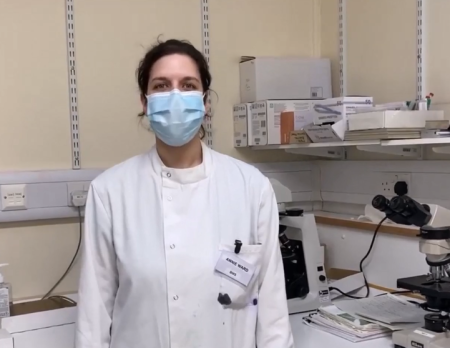Publish date: 24 June 2021
On Biomedical Science Day, microbiologist Annie Ward tells us why she became a microbiologist and what the job entails.

I started in 2013 as a medical laboratory assistant in microbiology at North Tyneside General Hospital and then went on to work as a biomedical scientist at Harrogate District Hospital and Hull Royal Infirmary before coming back to North Tyneside.
I got into this role as I enjoyed science subjects at school, particularly biology. One of my biology A-Level modules was in microbiology and this made me decide to look into microbiology degrees. I then chose to study medical microbiology and immunology at Newcastle University. I had a keen interest in healthcare so decided that a job in an NHS microbiology laboratory would be perfect. I also love microscopy!
The microbiology department at North Tyneside General Hospital is 24/7 so an average day includes early shifts, late shifts, weekends, bank holidays and night shifts . The laboratory is split into different sections, or benches. Each of these benches has a biomedical scientist assigned to it each day.
You never know what work is going to come into the laboratory day-to-day so you have to be adaptable and have knowledge and skills to work with all sample types. Not all bacteria like to behave as you would expect, sometimes it can be difficult to get them to grow and do what you want them to!
We are looking for bacterial, viral, fungal and parasitic infections from a variety of sample types. Samples for bacterial culture are plated onto specific agar plates depending on the sample type and clinical details and incubated in an appropriate environment (there are O2, CO2, anaerobic and microaerophilic incubators). Any organism that grows can be identified in 20 minutes and antibiotic sensitivity testing is performed. We are also able to look for antibodies or antigen to specific organisms in blood samples.
There is a vast range of organisms that we are able to look for from patient samples, this allows me to have a wide range of knowledge of different species and gives me a varied working day. I also love being involved behind the scenes of patient care, I am able to inform medics of the identification of organisms from samples and the antibiotics that may help to cure a patient.
If you are interested in this as a career I would suggest trying to study an accredited degree with a placement in a laboratory that allows you to complete your Certificate of Competence or Registration portfolio whilst at university. Take any opportunity you can to gain experience within a laboratory, and don’t be afraid to start working as a laboratory assistant first to gain NHS laboratory experience.
